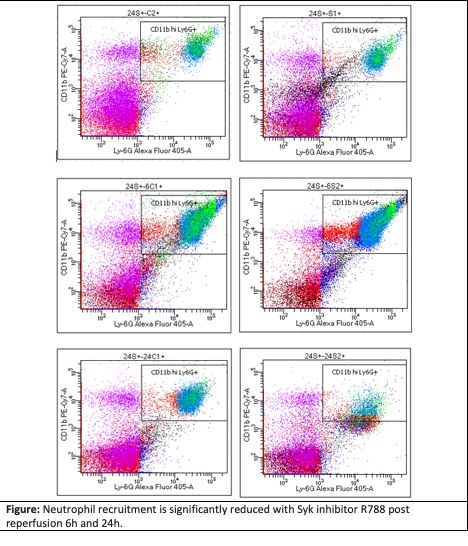Therapeutic Inhibition of Spleen Tyrosine Kinase Decreases Hepatic Damage after Ischemia Reperfusion Injury
Surgery, University of Florida, Gainesville, FL
Meeting: 2020 American Transplant Congress
Abstract number: C-361
Keywords: Ischemia
Session Information
Session Name: Poster Session C: Ischemia Reperfusion & Organ Rehabilitation
Session Type: Poster Session
Date: Saturday, May 30, 2020
Session Time: 3:15pm-4:00pm
 Presentation Time: 3:30pm-4:00pm
Presentation Time: 3:30pm-4:00pm
Location: Virtual
*Purpose: Hepatic ischemia/reperfusion injury (IRI) is a major challenge in transplantation. The complex array of interrelated signaling events in IRI have been studied individually, but effective clinical treatments have yet to be developed. We recently performed a comparative multi-omic analysis in both a mouse model of hepatic IRI and post-reperfusion biopsies from human orthotopic liver transplants. Our analysis corroborated previously implicated signals. However, we also identified the tyrosine kinase Syk as a potential target for decreasing IRI. Syk is an important mediator of neutrophil activation in inflammation, but it has not been studied in the context of IRI. Therefore, in this study we build on our previous findings and examine the impact of this kinase on neutrophil activation in liver IRI.
*Methods: 10-12 week old mice were subjected to 70% partial warm ischemia for 60 minutes, followed by 6 and 24 hours of reperfusion. The treatment (Syk inhibitor R788) group was treated for 5 days prior to IRI. Untreated mice were used as controls. Sham operations were used as negative controls. Blood and hepatic tissue were collected at each time point for analysis. Standard flow cytometry of whole blood was performed for the cell specific markers Ly-6G, CD11b, CD4, F4/80, CD38 and CD45RA to identify specific neutrophil subpopulations.
*Results: Combined flow cytometry and immunohistochemical analysis revealed that specific Syk inhibition with R788 significantly reduced neutrophil activation and recruitment to the liver after reperfusion, when compared to the control group (Figure). In association with the reduced recruitment of activated neutrophils, the Syk inhibitor pre-treated group showed significantly lower levels of plasma ALT, confirming an improved and protective effect on the liver function after IRI at 6h and persisted up to 24h compared to the control group.
*Conclusions: This study confirms previous findings from the multi-omic analysis, demonstrates the power of this approach in finding potential drug targets and specifically reveals that the tyrosine kinase Syk is an important mediator of neutrophil activation and recruitment in hepatic IRI. Moreover, it provides supportive evidence for the potential future use of specific Syk inhibitors in clinical treatment of hepatic IRI after liver transplantation.
To cite this abstract in AMA style:
Zarrinpar A, Boominathan V, Kobayashi A, Duarte S. Therapeutic Inhibition of Spleen Tyrosine Kinase Decreases Hepatic Damage after Ischemia Reperfusion Injury [abstract]. Am J Transplant. 2020; 20 (suppl 3). https://atcmeetingabstracts.com/abstract/therapeutic-inhibition-of-spleen-tyrosine-kinase-decreases-hepatic-damage-after-ischemia-reperfusion-injury/. Accessed February 27, 2026.« Back to 2020 American Transplant Congress

